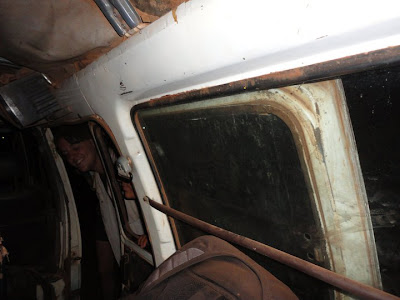 |
| The first night of our journey, we stayed in Tamale after a 12-hour bus ride from Accra. Five people split this room, which was worth it since it had air conditioning! |
 |
| We waited at the Tamale bus station for five hours the next day for our bus to Mole National Park. |
 |
| The beautiful Mole National Park |
 |
| Baboons were all around the park, including at the breakfast table! |
 |
| Warthog (also known as Pumba) |
 |
| Elephant footprints all over the park |
 |
| Walking in search of elephants |
 |
| First elephant sighting! |
 | ||
Transport to our canoe ride
|
 |
| A watering hole in Mole that we saw on a walking safari. There are many crocodiles in this lake, but we only saw a few since they are afraid of people in this park. |
 |
| Elephant hiding behind a tree! |
 |
| Our last night in Mole, we went on an overnight trip into the park and slept in this treehouse. At night, we heard the resounding calls of the bush, and even listened to hyenas howl a few times. |
 |
| We toured the village with a man named Ibrahim, the founder of the Larabanga Kids Development Project. |
 |
| Ibrahim |
 |
| The sun rising over Larabanga |
 |
| The oldest Mosque in West Africa is in Larabanga |
 |
| A woman making shea butter |
 |
| Shea butter! |

 | ||
| The next day, this car brought us from Leo to Nazinga. We piled into the back and sat on wooden benches for the four-hour bumpy ride through village roads and the bush. |
 |
| The road to Nazinga |
 |
| Finally at the Nazinga Reserve! |
 |
| Four elephants bathing in the watering hole right next to our lodging and restaurant at Nazinga |
 |
| The dormitory at Nazinga |
 |
| Inside the dormitory |
 |
| Crepes for breakfast at Nazinga |
 |
| Elephants bathing in the watering hole |
 |
| The morning we were leaving, herds of elephants came out to the watering hole. In this picture, there are at least thirty male, female, and even baby elephants in the water, walking around the trees, and playing in the dirt. |
 |
| The elephants walked so close to us! At Nazinga, the elephants (and crocodiles) are not afraid of people, probably due to the relative lack of poaching in the reserve. |
 |
| Driving out of Nazinga Reserve |
 |
| Our transport from Nazinga to the border of Ghana at Paga. We sat in the bed of a pickup truck as we drove out of the park and through Burkinabe villages. |
 |
| Luckily, we found a bus right when we crossed the border into Ghana that would take us straight to Kumasi, a mere six hours from Accra! We boarded the van at around 2 PM and arrived in Kumasi at 1:30 AM. |
 |
| The sun rose over Accra as we drove, and finally arrived home at 6 AM. The trip had definitely taught me a lot! While traveling, it is important to commit to the experience. I was very happy to see Mole National Park, since it is an important region and landmark in Ghana, but I feel that the more rewarding experience was had at the Nazinga Reserve. Mole is a tourist destination; an exotic one, but slightly touristy all the same. Nazinga is a destination for travelers, those seeking total immersion in the wildness of the bush. There were very few visitors at the reserve, and all had traveled great distances and by every means possible to get there. My standards for cleanliness, cuisine, and accommodation were redefined, unapologetically so. The reward? West African paradise. |



















